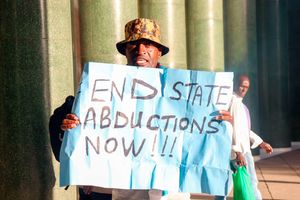
Demonstrators carry the body of a protester who was shot dead at Parliament Buildings during the anti-Tax Bill protests in Nairobi on June 25, 2024.
Excessive and unnecessary use of force during protests, threats to freedom of expression and association and assembly, forced evictions, arbitrary arrests and detentions, combined with enforced disappearances.
These were some of the violations that marred Kenya last year, a report has revealed.
Also, at least 60 people were killed during the anti-Finance Bill 2024 protests that rocked several parts of the country last June, giving continuance to extrajudicial killings, with 600 protestors arbitrarily arrested.
This is according to the latest Amnesty International report dubbed “The State of the World’s Human Rights,” released this week, which also noted a significant rise in gender-based violence in Kenya.
The report also pointed to the increased targeting of journalists, medics and activists by the State on unprecedented levels, which left several professionals with bullet injuries and serious threats to their lives.
“Journalists covering the protests were beaten, arrested and had their cameras confiscated, and people were arrested for, or otherwise prevented from, photographing or filming the events…medical personnel who responded to injured protestors,” Amnesty International noted.
Lawyers too bore the brunt of the state’s wrath as they too were at times arrested and detained. When they were not arrested, they were denied access to their clients and even intimidated to pressure them into dropping cases.
The State, the report noted, employed the use of legislation to draft regulations aimed at restricting freedoms of expression and assembly as well as extensive digital surveillance was used to target various online activists, with the State disrupting access to the internet.

Rights activists during an anti-abductions protest on Aga Khan Walk in Nairobi on December 30, 2024.
The draft laws supported by the government, Amnesty cautioned, were meant to counter dissent and, if passed, would threaten the rights to freedom of expression and peaceful assembly.
“They included the Assembly and Demonstrations Bill, 2024. If enacted, it would expand police powers to restrict, disperse and limit protests and change notification provisions- as provided in the Public Order Act-to require police permission for a protest to proceed,” the report stated.
Disregard for the rights of persons apprehended by police officers continued with the report pointing out that some were held beyond the legal limit of 24 hours, with others being presented to court on trumped-up charges.
Whereas the law provides for a notice period before vacating people from their homes, thousands of people in Mathare and Mukuru Kwa Njenga settlements were left stranded amidst heavy rainfall and flooding after the government forcibly evicted them from their houses.
The use of Kenya Defence Forces (KDF) soldiers to assist the police in combating the anti-finance Bill protests last year was flagged by Amnesty who pointed out that this happened “although constitutional provisions allow this only in cases of emergency and disaster or restore order in places affected by unrest or instability following parliamentary approval”.
Healthcare crisis
Thousands of Kenyans’ access to health services was also hampered by the government’s decision to replace the National Health Insurance Fund with the Social Health Insurance Fund.
“Although presented as aiming to provide health coverage for all Kenyans, delays in implementing the system meant most hospitals did not receive sufficient income from the government to treat patients on the SHIF scheme,” the report stated.
The sentiments of this report were also echoed during the International Commission Jurists (ICJ) of Kenya’s Citizens’ Assembly on Wednesday, where threats to civic freedoms, targeting of journalists, activists and insufficient safety for the public were highlighted as impediments to Kenya’s democracy.
Issuing his keynote speech during the Assembly, Prof P.L.O. Lumumba called on Kenyans to elect leaders who have a track record of service delivery and not based on their tribes.
“Unfortunately, we elect comedians, and we all know that when you elect a comedian, take him to the palace, then the palace becomes a circus. Much as we have a beautiful constitution, what use is it if we breach its contents?” he posed.
“The same leaders jostling for positions served in the previous governments. The forest may change, but the monkeys remain the same and we must bring an end to this through electing the right leaders,” he said.

Prof PLO Lumumba.
Protas Saende, the Chairperson ICJ Kenya, said that the Citizens' Assembly was crucial in helping analyse the state of security and civic freedoms in the country as well as fostering intergenerational dialogue on the evolution of democratic participation in the country.
“We are living in unprecedented times. In recent weeks and months, we have witnessed a new wave of civic awakening in Kenya in the face of adversity. Let us, as Kenyans, realise that we are the system and interrogate our systems and build coalitions that go beyond the ballot,” he said.









